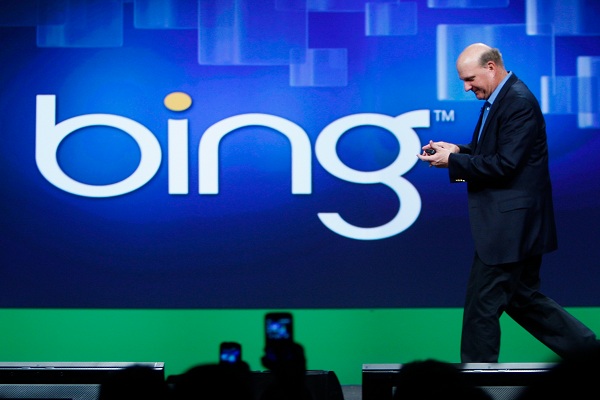
Firefox 3.6 RTM officially released, includes personalization
Download Mozilla Firefox 3.6 for Windows from Fileforum now.
It's been said that improvements to Web browsers aren't truly improvements unless the user can both see and feel them. Mozilla's latest efforts in that area have just been finalized: a new stable version of Firefox that not only provides more control features to the new Windows 7 taskbar, but lets you paste posters on its wall.

Baidu: Register.com helped 'Iranian Cyber Army' commit criminal trespass
Leading China search engine Baidu's lawsuit against US domain registrar and ISP Register.com, filed yesterday, was not at all what analysts, especially in the British press, expected it to be: There's no evidence, including in the context of its many redacted paragraphs, of any sort of "retaliation" whatsoever against Google's new public stance against China in the wake of attacks against it that it claims emanated from China. Although diplomats from both countries may continue to play the Baidu case as another volley in a brewing trade dispute, from Baidu's perspective, that's not what it is at all.
Baidu's grievance is specifically against Register.com, not the country it's in; and it would probably have filed this very lawsuit had the Google attack never happened. The public portions of the initial complaint, released by US District Court in New York this morning, accuse Register.com not only of negligence in allowing its DNS records to be hacked, and Baidu traffic diverted to a Web site purportedly from the "Iranian Cyber Army" (which may not even be Iranian). Baidu goes so far as to say that Register.com "aided and abetted" whoever produces that Web site, whom Baidu refers to as the "Imposter," in the commission of what Baidu describes as trespass upon its property. Evidence of the Imposter's true identity and/or whereabouts may, based on Betanews' reading of the complaint, could very well appear within those redacted paragraphs.

Google: We're ready for a dialogue with China
This afternoon, just hours following Microsoft's stunningly fast response to a critical Internet Explorer vulnerability made stunningly public by Google last week, a Google spokesperson told Betanews today that it expects to engage in a dialogue with the government of China within the next few weeks. The subject will be the status of its business relationship with that country, following Google's allegations that a recent attack on its servers originated in China.
Whether Google will take the next step -- specifically, discussing the substance of these talks with the US government -- is something the company may not yet have considered, judging from the response to our question from Google's spokesperson today.

Out-of-band update for Hydraq exploit from Microsoft Thursday
In an unprecedented response to the news just last week of attacks on Google's servers, and others, from a sophisticated Trojan first catalogued as Hydraq, Microsoft confirmed to Betanews this afternoon that it will be publishing a security fix for the vulnerability tomorrow, January 21, at approximately 10:00 am PST. The company will issue the update with a "Critical" severity rating.
"Microsoft continues to see limited attacks, and to date, the only successful attacks have been against Internet Explorer 6," the company stated this afternoon. "Customers will be apprised of any changes in the threat landscape through the Microsoft Security Response Center blog, and changes to the advisory [issued last week].

Microsoft: Out-of-band fix to IE6 Google/China exploit to come soon
In a display of calm defiance against the notion that reacting publicly to a threat against its customers is a "marketing tactic," a Microsoft spokesperson confirmed to Betanews this afternoon that a fix for the recently uncovered remote code execution vulnerability in Internet Explorer 6 will be made publicly available some time prior to the next round of Patch Tuesday updates. The exact time of the patch's release, as well as the scope of users who should install it, will be revealed tomorrow.
This would limit Microsoft to a four-week response window since last Tuesday, when Google broke its veil of silence to reveal its servers had been attacked by sources apparently emanating from China.

Bing may beat Google to compliance with EU anonymization directive
In an announcement early this morning, Microsoft stated it is altering the policy of its search engine Bing with regard to retaining personal data collected from its users. Under a new policy that may take as long as 18 months to implement, the company says, it will anonymize its data logs after only six months of retention rather than the previous 18, in compliance with a European Union directive -- perhaps the first major US-based search engine to comply.
In April 2008, the European Union's advisory body of member states' telecommunications ministers, called the Article 29 Working Party, advised that search engines doing business in their region should anonymize the personally identifiable data they've collected on their users after a six-month period. The theory here has been, after six months' time, search engines won't be able to make much use of them to refine the efficacy of current queries -- the original excuse for Google, Yahoo, and Microsoft to keep such data for longer periods.

NSF study gauges Americans' interest in tech news at 12-year low
A study released yesterday by the US National Science Foundation (PDF available here) cites data from the Pew Research Center and other leading academic centers and universities, as indicating that Americans' interest in news about science and technology topics is perhaps 35% lower today than at the advent of the Web.
Most notably, a Pew Research survey of an average of 3,615 respondents per year, in an ongoing study dating back to 1977, shows a precipitous decline in the number of Americans who say they "closely follow" science and technology stories, from 1996 to 2008. While 20% of respondents admitted to closely following tech news prior to the Web's deployment on the Internet, only 13% admitted so in 2008. (Data for 2009 has yet to be assimilated.)

Mozilla: No, Firefox XUL add-ons are not an endangered species
Last May, Aza Raskin and the team at Mozilla Labs introduced Jetpack, essentially an extensibility model for the organization's Firefox browser that enables new JavaScript apps to modify the functionality of the browser on the fly. The goal is that anyone who could create a Web page could use exactly the same tools (HTML, CSS, and ordinary JavaScript, plus the appropriate APIs) to build a Firefox add-on. Now on version 0.7, Jetpack is slowly gaining momentum.
But where will that momentum lead? Is Mozilla seriously considering the Jetpack development model as an eventual replacement for XUL (XML User Interface language, pronounced "zool" like the refrigerator-based creature from Ghostbusters)? That was the question ZDNet blogger Adrian Kingsley-Hughes asked earlier this week, in a blog post entitled, "Is Mozilla preparing to ditch add-ons as we know them?"

The Google attack: Human rights threat or IE browser exploit?
On Tuesday, Google described an alleged series of attacks on its servers and others' as an apparent effort by an unknown China-based source to gain access to private information about human rights activists in that country. No less than Secretary of State Hillary Clinton acknowledged her staff being briefed by Google on the matter -- this after almost five years of apparent silence toward government officials from Google regarding its business arrangement with the government of China.
But in a blog post today which officially dubbed the alleged attack "Operation Aurora," McAfee CTO George Kurtz, in revealing his company worked with Google in investigating the attack, suggested a completely different motive. Specifically, Kurtz alleged that a new and heretofore unseen malware turned up during his investigation, appeared to be designed to search for a specific type of company intellectual property.

Eight days later, Google acknowledges 3G problems on Nexus One
At 2:22 pm Eastern Standard Time today, some eight days after a support thread was first launched by a Google Nexus One user who noticed his phone kept flipping back and forth between 3G and EDGE services, a fellow named Ravi whose job description in his Google profile is listed as "Google Employee, Doofus Maximus" wrote in to assure customers the company was working with its partners to investigate the issue. The problem may affect several hundred Nexus One phones, though evidently -- and thankfully -- not all of them.
"Hey Folks, this is your friendly neighborhood Google Guide here to clear some up some confusion around all these 3G shenanigans!" Ravi's post began. "We (by 'we' I mean Google, although HTC and T-Mobile are both getting reports as well) are getting reports from some users who are having problems maintaining a 3G data connection on their device. We're actively working with our partners to investigate these issues and identify what's going on. Most people don't seem to be running into this issue, but for those of you who are, we understand your concern and appreciate your patience."

On second thought, maybe the RIAA did conspire to fix prices, appeals court finds
Did the United States' major record labels, as early as 2001, conspire to establish a system for the distribution and sale of digital music that would have seen subscribers paying up to $240 per year for the right to download up to two songs per artist per month, even then at a retail price indexed at the wholesale cost of $0.70 per song, with restrictive and unwanted DRM schemes attached? That was the assertion of a group of former customers of two music services that launched in 2001. Now, a US appeals court has ruled that the dismissal of their case in 2007 was in error, and that the entire recording industry can indeed be brought to court on antitrust charges.
The original case involved two of the music industry's first "legal download" services, created just months after the founding of iTunes. One was called MusicNet, the original music publishing service from RealNetworks, years before it first started Rhapsody. MusicNet was the culmination of a joint agreement between Real and three of the nation's five major music publishers: EMI Group, Warner Music (then part of AOL Time Warner), and Bertelsmann (now Sony Music). The other was Pressplay, formed by the other two publishers: Universal Music Group (formerly MCA) and the original Sony Music Entertainment.

Google's change of heart on China draws attention from Congress
Yesterday afternoon, citing what it described as "cyber attacks" -- incursions into its own systems it said originated from China -- Google said it would review its business arrangement with the government of China that enables it to operate a search engine under the domain name google.cn. The company said it believes the alleged attackers were searching for information on Chinese human rights activists.
This morning, US Secretary of State Hillary Clinton acknowledged that Google had briefed the State Dept. on these attacks, prior to yesterday's announcement. Though the extent of those briefings were not divulged, they could represent a break of the unofficial embargo the company has imposed on any news of its business dealings with the Chinese government, since their initial agreement was reached in late 2005. Now, Rep. Tim Ryan (D - Ohio), one of the congressmen who had led the unsuccessful effort to compel Google -- along with other American Internet companies, including Microsoft, Yahoo, and Cisco -- to explain the nature of its business arrangements with China, tells Betanews this afternoon that Google may have had this coming.

Adobe Reader 9.3 patch addresses critical JavaScript security issue
Download Adobe Reader 9.3 for Windows from Fileforum now.
Usually on a Patch Tuesday, the discussion turns to Microsoft; but amid a very light round of Windows fixes, it's Adobe in the spotlight today. Last month, a serious and potentially easily exploitable vulnerability was found in a JavaScript API call, DocMedia.NewPlayer -- a situation where an intentionally crafted PDF file could invoke the call, deallocate the memory allocated when the media player is generated, and then execute the code in that de-allocated memory, without need for privilege.

Microsoft will not deny report of Windows Mobile 7 delay to 2011
Last Sunday, former Tom's Hardware correspondent Theo Valich, now editor-in-chief of Bright Side of News, referred to sources from at least five smartphone manufacturers plus Microsoft itself as telling him that Windows Mobile 7 would not be made generally available until 2011 -- what those manufacturers would perceive as a delay. This despite indications from CEO Steve Ballmer last Wednesday at CES that an announcement of a forthcoming product would come at Mobile World Congress next month, and a preview of coming attractions given to Betanews' Tim Conneally by Windows Mobile Senior Product Manager Greg Sullivan at CES the following Friday.
Given multiple opportunities to clarify Valich's report, and to deny that any delay was in the works, Microsoft spokespersons would not provide Betanews with information that shed any light on the timeframe, or that would refute the information from vendors cited in that report. The company appears to be taking the position that, since it has never set a firm timetable on WM7's release, whatever date it announces, however far in the future that might be, is not a delay.

Pattern emerges for Nexus One 3G problems, points to baseband firmware
In an effort to minimize the apparent scope of the problem faced by at least a sizable plurality of Nexus One customers this week, Google has issued a statement to the press. It essentially acknowledges what we've all seen with our eyes, that users are experiencing widespread 3G connectivity issues, but it offers no information as to what measures are being taken to address those concerns.
"We are aware of the issues that have affected a small number of users, and are working quickly to fix any problems," reads the statement from Google to Betanews this afternoon. "We hope to have more information soon. When we do, we will post it to the user forum."

